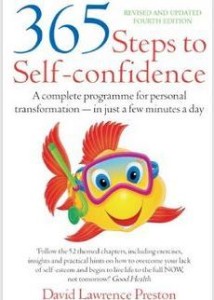Self-esteem is happiness, success and a whole lot besides. It governs your behaviour in every area of your life and without it you’ll almost certainly underachieve.
Self-esteem is the experience of feeling that you’re worthy of happiness and capable dealing with life. It’s a combination of self-confidence (beliefs about your capabilities) and self-respect (beliefs about your value and worthiness). It’s closely related to your self-image – the way you see yourself – and is absolutely fundamental to everything you do.
For example:
- People with low self-esteem always underachieve. A poor self-image effectively places a glass ceiling on your achievements.
- It’s also at the root of many health and psychological issues such as weight problems and most eating disorders.
- Much crime is caused by drugs, unemployment and/or poverty – all heavily influenced by low self-esteem.
- People with low self-esteem usually have problems in their relationships and social lives. Their constant need for reassurance can impose an intolerable strain on any relationship.
- It’s the fundamental cause of most marriage breakdown, parent-child friction and sexual problems.
- If you feel good about yourself, you are more willing to try new things and meet new people. You’re also more likely to be successful in competitive activities such as sport.
- If you have high self-esteem, you’re more likely to be interested in self-development because you know you’re worth it.
Your self-esteem is made up of three core sets of beliefs and feelings about yourself:
- The value you place on yourself; your feelings of self-worth. Key words: ‘I deserve’;
- Your beliefs about your ability to cope with life’s challenges, solve problems and think for yourself; your feelings of competence. Key words: ‘I can’;
- Your beliefs about the way you fit into society and relate to others. Key words: ‘I belong’ and ‘I am accepted’.
How you feel about yourself varies from day to day, hour to hour and situation to situation. You may be confident at work, but not in social settings; you may regard yourself as a kind and loving person, but hate your body. And so on.
Your self-image covers:
- Your physical make-up: health, fitness and appearance.
- Your emotional nature, e.g. are you a loving person, caring and considerate, or beset with anger, worry, guilt or fear?
- Your intellectual make-up: your knowledge, qualifications, skills and intelligence.
- Your social standing: beliefs about what other people think of you and whether you feel comfortable in social situations.
You are probably more deserving and more capable than you think. Remember, most of us only ever use 5-10% of our abilities – perhaps less. This means that over 90% of your talents waiting to be discovered and used. Isn’t that exciting!
How your self-esteem was formed
Your self-esteem was more or less established by the time you reached eight or nine years old. By then, the average child has already received over one hundred thousand negative injunctions from adult authority figures. The accumulated effect over many years can be very destructive.
Here are some examples from my own observations:
- A seven year-old girl is struggling to keep up with Mum on the way to school. ‘Come on. Hurry up,’ says Mum. ‘Mum’s cross with me,’ she thinks, ‘I’m not good enough.’
- A twelve year-old boy volunteers to take over the drum stool in a school concert at the last minute. During the rehearsal, he misses a beat. ‘I thought we had an intelligent drummer,’ sneers the teacher. (Sarcasm is very damaging to children; they take most things adults say literally.)
- As a girl, Diane was repeatedly told that ‘overeating runs in the family’. By the age of thirty, she is three stone overweight. On a similar theme, John, an obese 52 year-old, has a compulsion to eat everything put in front of him because, as a boy, he wasn’t allowed to leave the table until he’d cleared his plate.
- A small girl picks up a bag of sweets in a supermarket and asks her Mum if he can have them. ‘No you can’t’ comes the reply. ‘They’ll make your teeth drop out and you’ll be even uglier than you are now.’
Incidents such as these cause leave a child emotionally scarred for many years.
Sadly, many people go through life believing that they are unable to overcome their conditioning, but it is simply not true. Many happy and successful people suffered as children. In most cases, it they simply decided not to let it hold them back.
Without high self-esteem you’ll always feel as if someone else is in control of your life, but the exciting thing is, no matter what your background or your current level of self-esteem, you can improve. Big improvements can be made in as little as 3-6 months.
Forgive your parents
Whatever your childhood experiences, commit yourself to the first two steps to higher self-esteem:
1. Decide to do something about it.
2. Forgive your parents.
Forgiving your parents is one of the most liberating things you can do. Continuing to blame them for your lack of self-esteem prevents you from developing a healthy, adult relationship with them. After all, they were products of their own conditioning, and they probably did the best they knew how, struggling to raise you whilst coping with all the other pressures of life.
Whether they deserve to be forgiven or not is not the point. You’re only hurting yourself by hanging on to all that ‘stuff’. You owe it to yourself to be free of all the resentment and bitterness you’ve been carrying.
Remember, it is not the people, events and circumstances in your past that determine your confidence and self-esteem, but your beliefs about those people and events.
©David Lawrence Preston, 30 7.2016
Follow me on Facebook and Twitter @David_L_Preston
How to Books, 2010


